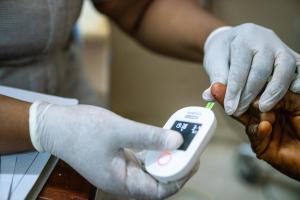Lesotho advances noncommunicable disease response with PEN-Plus
Maseru—Lesotho is taking decisive steps to confront a growing health challenge, the rise of non-communicable diseases (NCDs). While HIV, tuberculosis, and other communicable diseases remain significant public health concerns, other disease conditions such as hypertension, diabetes, cancer, and chronic respiratory illnesses are increasingly prevalent, now accounting for more than 45% of all deaths in Lesotho in 2019, according to the World Health Organization (WHO, Country Disease Outlook, 2023).” For many Basotho, accessing treatment has meant traveling long distances, sometimes having to travel to another country, and/or spending large portions of household income on private facilities, as care for NCDs has been limited in the public health system.
In response, the Ministry of Health has adopted the WHO-recommended PEN-Plus strategy, a bold move designed to bring quality care for NCDs closer to communities by strengthening services at secondary-level health facilities. Under this approach, patients will be able to access lifesaving care within their districts, sparing them the financial burden of private treatment and the hardship of traveling to distant hospitals.
Speaking about the initiative, Dr. Malitaba Litaba, Head of Non- Communicable Diseases (NCDs) in the Ministry of Health, stated, “The PEN-Plus strategy represents a major step forward for Lesotho. For too long, families have struggled to access essential care for diseases that are now the leading causes of death. By strengthening services at district hospitals, we are bringing treatment closer to the people and protecting our citizens from preventable suffering and financial hardship.”
WHO has worked alongside the Ministry of Health not only by mobilizing financial resources, but also by providing technical support, thanks to the support from the Helmsley Charitable Trust through the WHO Africa Regional Office. Together, they have developed national NCD guidelines and protocols that establish a clear and consistent roadmap for doctors, nurses, pharmacists, laboratory technicians, and other healthcare workers. Training manuals tailored to the needs of frontline providers have been produced, ensuring that healthcare workers are fully prepared to implement the new strategy. Recognizing that prevention is as important as treatment, a comprehensive health promotion guide was also created to help communities better understand how to reduce their risk of developing NCDs.
By June 2025, six districts had oriented 51 personnel on the PEN-Plus strategy, with hospitals in these districts preparing to deliver expanded NCD services, and additional districts scheduled for training later in the year. For the first time, Lesotho has a coordinated framework with standardized protocols, training materials, and health promotion tools- all working toward the shared goal of reducing the heavy burden of NCDs on individuals and families. This progress reflects the power of collaboration, with partners such as Solidarmed and the Elizabeth Glaser Pediatric AIDS Foundation (EGPAF) contributing their expertise alongside WHO and the Ministry of Health to turn this vision into reality.
The WHO Representative in Lesotho, Dr. Innocent Nuwagira stated, “Non-communicable diseases are a silent crisis across Africa, including the Kingdom of and Lesotho. Through the PEN-Plus strategy, we are ensuring that patients can receive quality care close to home, supported by trained healthcare workers using clear and detailed protocols to ensure quality in the care they receive. This is an investment in the health and wellbeing of all Basotho.”
Additionally, the Ministry of Health, led by Honourable Selibe Mochoboroane, recently launched the Multisectoral Non-Communicable Diseases and Injuries (NCDIs) Coordinating Mechanism at the Manthabiseng Convention Centre in Maseru. The launch aimed to establish a multisectoral coordinating body for NCDIs, raise awareness of these diseases in Lesotho, and present a roadmap for their prevention, detection, control, and treatment. The government alongside other stakeholders has also taken complementary steps to strengthen the country’s response to NCDs, including the building of a dedicated Cancer Centre and the Oasis of Hope Hospice, reflecting a holistic, multisectoral approach.
Honourable Minister of Health, Selibe Mochoboroane, emphasized the importance of the initiative, saying, “Nearly half of our people are losing their lives to these silent killers, and too often we recognize the extent of the problem too late. The National Multisectoral NCDIs Coordinating Mechanism marks a turning point. NCDIs are not just a health challenge but societal challenges, shaped by social, economic, political, and environmental forces. The real crisis lies within our communities and daily lives.”
The impact of this initiative is expected to be profound. By strengthening secondary-level facilities, providing clear clinical protocols, and equipping health workers with the right tools, the PEN-Plus strategy spares patients preventable complications, reduces out-of-pocket costs, and improves access to lifesaving care. More than an expansion of services, it integrates prevention, treatment, and community engagement into a sustainable, coordinated health system, moving Lesotho closer to universal health coverage.



